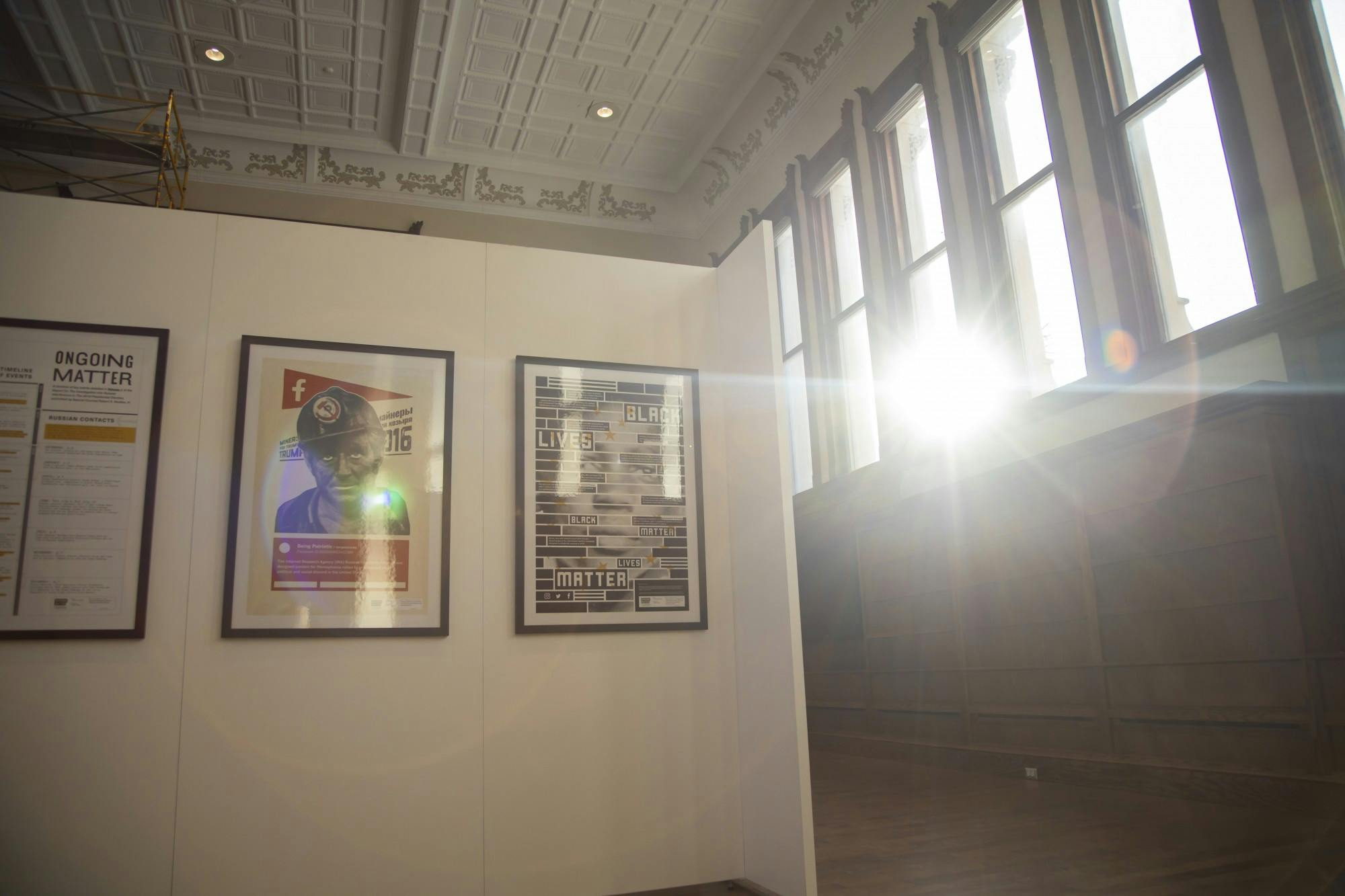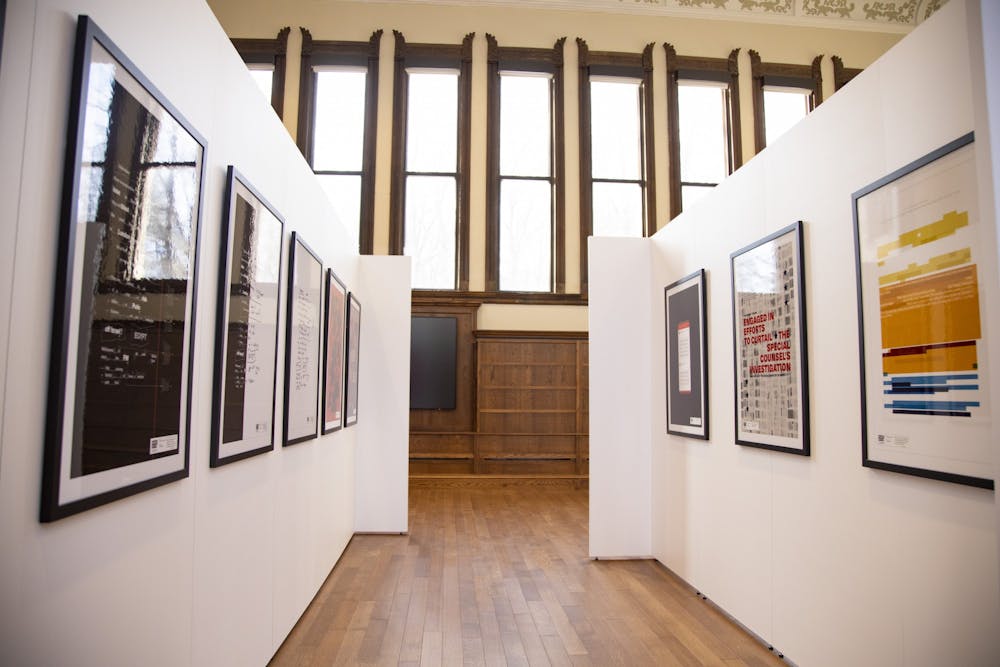Sarah Edmands Martin was sitting in her home, reading the Mueller report in 2019, making sketches of images that were brought to mind. Digital sticky notes filled her computer screen.
“I remember feeling it was tough to move from page to page,” Martin, who holds an English Language and Literature degree and is an assistant professor of graphic design at IU, said.
She said she started with skimming the pages and wondered how difficult it would be for someone to read this report without the literature background she has. This was the first of many evenings she would spend reading and trying to understand the report. She remembers sending texts to her design friend and colleague, Anne H. Berry, like “Oh my goodness. What is this?”
“The contents were really fascinating,” Martin said. “We wanted to communicate those contents. We felt that was kind of our imperative as graphic designers, as communicators, to take up that charge.”
The Mueller report, or the Report On The Investigation Into Russian Interference In the 2016 Presidential Election, is a dense, 448-paged document analyzing Russian interference and President Donald Trump’s conduct leading up to and following his election. The Ongoing Matter posters, which make up a majority of the project, are one way Berry and Martin tried to overcome the barriers of communication presented in the report.
Martin started reading the report because Berry reached out to her and other design colleagues about the importance of the document. Berry, who is an assistant professor of graphic design at Cleveland State University, said she started reading the Mueller report in the summer of 2019. She said she was stunned after reading about Russian propaganda on page 31 of Vol. 1 of the report which read “Miners for Trump / Bring back our jobs” to appeal to American voters. This propaganda led to a pro-Trump rally in Pennsylvania.
“As a designer, that struck me deep,” Berry said. “And I was like ‘Woah, they’re using the tools of my trade against my country.’ I just had this profound visceral feeling about it.”

Berry said she and the other colleagues she reached out to were shocked by the events of 2016. This included the Internet Research Agency, Russia’s troll farm, setting up pro-Trump rallies and various instances of contact between the Trump Campaign or related people and Russian officials/intelligence.
After about 10 years of knowing each other, Berry and Martin decided it was their ethical responsibility to better control how the public interacts with the Mueller report — they see the report itself as a design failure. They created a project called “Ongoing Matter: Democracy, Design, and the Mueller Report,” which takes the Mueller report to a more visual experience using poster-making.
The project’s exhibition on IU’s campus at Maxwell Hall, part of the Cook Center, ended March 12, and where it will be headed next is yet to be determined. But Berry and Martin said they have gotten inquiries about having the project exhibited elsewhere.
“Graphically, we talk about printed material as matter as specifically in graphic design and the fine arts, but also these things have continued to matter,” Martin said. “They are important. They carry weight. They’re affecting how we’re interacting with politics.”
The title “Ongoing Matter” refers to the sections of redacted information in the report for reasons of harm to ongoing matter, so the project itself is ongoing. Berry and Martin said they don’t see an exact end for the project in the foreseeable future. However, they said they don’t always see themselves as the ones leading the project either.
While they said they have found their work to be cathartic and necessary, it has taken an emotional toll on both of them.
“It hurts. It’s scary to see how it’s actually playing out,” Berry said. “You, know, like the Jan. 6 insurrection, we’re seeing the things that we were warned about years ago.”
From the election, creating the posters, organizing exhibits and considering health protocols amid a pandemic, they said they are ready for a break in the near future.
“I’m very fulfilled and grateful for the work but I also am ready to take a small break,” Martin said.
Regardless of what happens to the future of the project, Martin said she hopes this project can be used as a pedagogical tool for future young designers. If the goal of the report was to make the information in it accessible to the general public, Martin and Berry said it failed to do just that.
“A lot of the actual juicy content is footnoted, and it’s those footnotes where 50% of the page is footnotes,” Martin said.
Ongoing Matter attempts to reveal those juicy contents.
“I think it gives people a chance to understand the key points of the report and invite them, if they would like, to then do a deeper dive into the report,” Joe Hiland, associate director of the IU Arts and Humanities Council, said.
Hiland said the Cook Center tries to make information more accessible to the public. It primarily exhibits work from IU faculty to the general public, such as “Ongoing Matter,” making the work visible and available to more people.
“That’s what the Cook Center tries to do,” Hiland said. “It tries to take that work that’s done on campus and make it clear that it’s not just for the people on campus. It’s not just for academics. It is for everyone. And that goes back to what makes a democratic society healthy and functioning.”
Hiland said making something more accessible to the public is what promotes democracy.
Regardless of political affiliation or varying perspectives of the collaborators, Martin said this non-partisan project is about more than just the messages of the Mueller report, it’s also about considering how people understand that message.
Although the project is mostly poster-oriented, Berry said she wants designers to know design is more than poster-making, and it is not enough engagement. She said there has to be political engagement.
Berry said she grew up in a predominantly white neighborhood in a mixed family and Mennonite community. She said her parents were only able to get married after it was barely legal for them to do so. Her dad is a retired political scientist, and she’s since become a political junkie. For Berry, she said her upbringing is what inspired her to create work that comments on politics.
“I was always very much aware of politics in my own existence and the impact it had on my life and my family,” Berry said.




